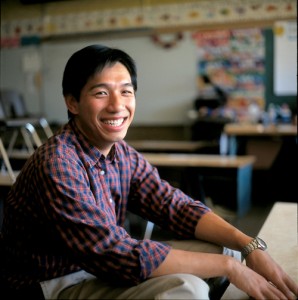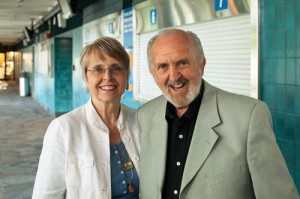A teacher from Taiwan learns some of the challenges and rewards of working with special-education students.

Sungti Hsu, ’05, is used to working with missionaries in the Provo Missionary Training Center, where he has been teaching Mandarin for two years. So when he started teaching math and reading to special-education kindergarten and first-grade students over the summer, he treated them like adults. He quickly learned, however, that his new classroom would require a different approach.
“Their attention span is so short, so you really have to keep up the pace while making sure they’re following you and understanding what you’re trying to teach them,” says Hsu, the only male student in the recently established mild/moderate disabilities track in the undergraduate special-education program.
Debra J. Uharriet, ’05, who taught in the same classroom with Hsu during the summer, remembers a day when he was teaching basic addition principles to his group of students. When he couldn’t find a place on the wall to post the cards he was using to teach them, he began taping them on himself. “He was just going crazy with all the symbols, and the kids loved it,” Uharriet says, noting that the children were able to quickly catch on to the principles he was trying to teach. “Even with other adults around, he was able to be uninhibited and connect on a level that worked for them.”
Hsu recalls that experience as one in which he realized “that learning can be really fun. Some of the students kept laughing and saying, ‘You’re being so silly,’ but they were learning and really getting it.”
Originally a wildlife and range resources major, Hsu started doubting his choice of study when his friends told him he wasn’t the lab-coat type. At the same time, the David O. McKay School of Education introduced a new undergraduate degree in special education. Hsu, who had learned to love teaching in the MTC, was drawn to the major in part because he has a cousin with learning disabilities. “It was always hard for me to communicate and interact with him,” Hsu says, “so I decided it would be good for me to get out of my comfort zone and learn about it.”
Hsu has spent the past year taking theory courses, observing and volunteering in special-education classrooms, and working with a job coach who helps young adults with learning disabilities transition from high school into the workforce. In his intensive five-week teaching class during the summer, he quickly learned some of the challenges of working with special-education students, but he got a taste of the rewards as well.
“It’s hard, sometimes, to make sure you’re meeting their individual needs and to make sure that they’re learning,” he says. “But it’s very rewarding to see them finally have that ‘aha’ moment when they understand something you’ve been working on for so long.”
Although he is not yet sure if he wants to work with young children or with high-school-aged young adults when he graduates, Hsu knows he wants to teach in an inner-city school, where he hopes to be “a big-brother figure.”
Regardless of what he decides, Hsu’s goals extend beyond finding a job. “I look forward to seeing my students in 10 years and seeing that they’ve become what they wanted to be, instead of having that label that they could never do anything,” he says. “I look forward to that day when I will see them being successful in different areas they choose. That’s important for me.”









